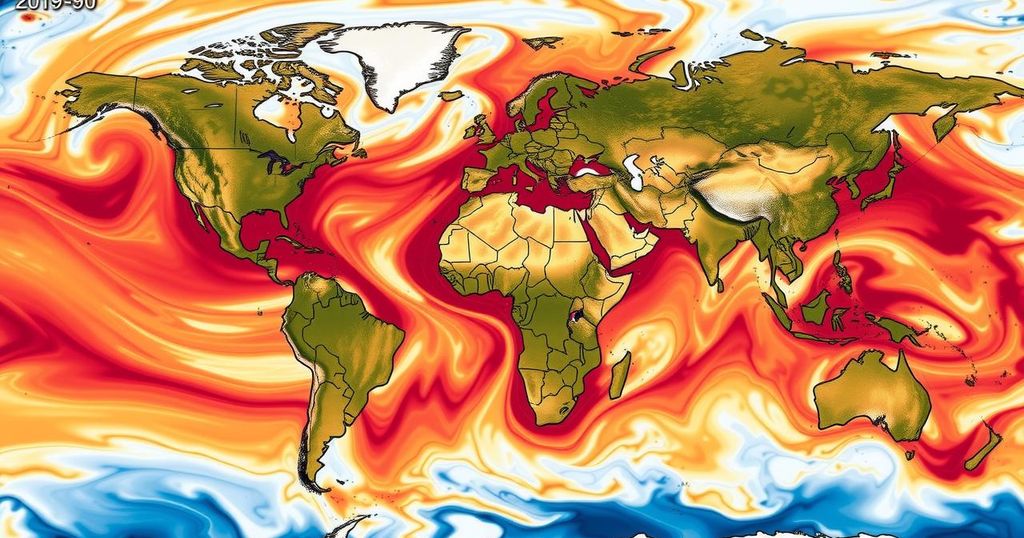The World Meteorological Organization predicts that 2024 will be the warmest year on record, following a decade of unprecedented heat spurred by human activity. Significant casualties and displacements due to extreme weather events have been recorded, with dangerous heat exposure increasing globally. Calls for urgent action to reduce emissions and enhance climate monitoring have intensified, especially following insufficient outcomes from recent climate conferences.
The year 2024 is projected to become the hottest year on record, as affirmed by the World Meteorological Organization (WMO) in a statement on December 30. This rise in temperature signifies the culmination of a decade characterized by extraordinary heat caused primarily by human actions. WMO Secretary-General Celeste Saulo has expressed grave concerns, indicating that record-setting rainfall and catastrophic flooding have led to significant hardships worldwide.
“In my first year as WMO Secretary-General, I have issued repeated Red Alerts about the state of the climate,” Saulo stated, emphasizing the destructive impact of extreme weather events, such as tropical cyclones and severe heat, which have resulted in thousands of fatalities and displaced millions.
According to the World Weather Attribution report, climatic changes intensified the death toll from various disasters, estimating that the number of lives lost due to climate-related extreme weather incidents could reach tens or even hundreds of thousands. Moreover, individuals are facing an alarming increase in dangerous heat exposure, with a reported 41 additional days on average of such exposure compared to pre-industrial levels, significantly affecting small island nations and developing countries that struggle with limited resources.
The situation has garnered the attention of UN Secretary-General António Guterres, who remarked on the seriousness of the ongoing climate crisis: “We have just endured a decade of deadly heat. The top ten hottest years on record have happened in the last ten years, including 2024.” He has called for urgent action to curb emissions and facilitate a transition towards renewable energy sources.
The WMO noted that the current warming level is at 1.3°C caused by human activities, with future forecasts indicating that the annual global temperature could temporarily surpass the 1.5°C mark set by the Paris agreement. This alarming trend is exacerbated by the failure at the recent COP conference in Baku to establish new measures for reducing fossil fuel consumption and achieving climate finance goals.
In response to these challenges, the WMO is advancing its Global Greenhouse Gas Watch initiative, aimed at enhancing the monitoring of greenhouse gas concentrations in the atmosphere and thereby closing data gaps. Additionally, the organization is advocating for improved early warning systems to help nations better respond to extreme weather situations.
As the world grapples with a changing climate, discussions about prioritizing vulnerable communities through enhanced data collection and climate services are becoming increasingly vital. The need for robust responses to climate-related crises has never been more urgent, as the evidence becomes increasingly evident in our day-to-day lives.
The World Meteorological Organization (WMO) plays a critical role in providing assessments and reports on global climatic trends. The overall trend has been a marked increase in global temperatures, largely attributed to human activities and greenhouse gas emissions. The WMO, alongside agencies like the World Weather Attribution, offers insight into the direct impacts of climate change, including extreme weather events that result in loss of life and economic destabilization. The recent statement highlighting 2024 as a record hot year comes amid growing international calls for emergency measures to counteract climate change, especially following the inadequate outcomes of climate conferences aimed at establishing stricter environmental targets.
In summary, the findings from the WMO indicate that 2024 is on track to be the warmest year recorded, driven by anthropogenic factors and culminating a decade of severe climate impacts. With extreme heat and weather-related fatalities reaching troubling heights, the call for concerted global action becomes increasingly critical. The WMO’s ongoing initiatives to monitor greenhouse gases and bolster early warning systems underscore the pressing need for comprehensive strategies to combat climate change and protect vulnerable populations from its devastating effects.
Original Source: healthpolicy-watch.news






